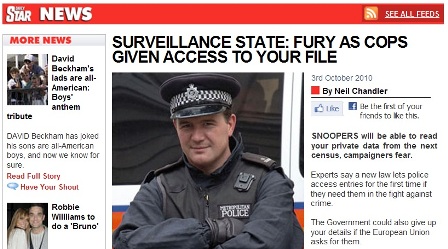Census confidentiality robustly defended – but is the law so robust?
The Office for National Statistics and the UK Statistics Authority are prepared to defend the confidentiality of Census information to the limits of the law.
Respecting confidential personal information is “a fundamental tenet of the Authority and ONS” say Stephen Penneck, Director General of ONS, and Sir Michael Scholar, Chair of the Authority, in almost identically-worded letters to Jill Leyland, Vice-President of the Royal Statistical Society.
The letters, both sent this week, were in response to her anxiety that provisions in the 2007 Statistics and Registration Service Act might enable breaches in the confidentiality of information to be gathered in next March’s Census.
Both men say that personal information will never be volunteered for any non-statistical purpose. If disclosure is sought they will always refuse to allow it, “and will contest the case to the maximum extent possible under the law, using each stage of appeal, in the Courts if necessary, in order to ensure statistical confidentiality.”
Concern has arisen because of a clause in the 2007 Act that appears to sanction release of Census information on a number of grounds, including Community obligations, for the purposes of a criminal investigation in the UK or outside, or in the interests of national security. (See a former posting on Straight Statistics for fuller details.)
It is clear from the letters that any application for data will be robustly defended, and in an open manner – in other words, any arguments that arise won’t be conducted privately but in public “to the extent permitted under the law”. So, unless injunctions against publication are granted, the public should know what is going on.
Mr Penneck’s letter says that the 2007 Act allows exemptions to confidentiality when required by a court order. But this is not what a simple reading of the Act suggests. It says (Clause 39) that a court order is one ground for release of information, but does not say that such an order must precede release of information under the other grounds listed, including the three mentioned above.
It is not therefore clear (to me) how the authority or ONS could use the act to defend confidentiality in any of these cases. Sir Michael’s letter, which is shorter, does not make the same claim.
Furthermore, the version of the act accessible on the legislation.gov.uk website, which lists all UK legislation and changes subsequently made to it, does not indicate any changes to the 2007 Act that would make release of information conditional on a court order. The Act itself provides no information on how such requests for information should be made, or responded to. That seems to leave a lot of room for legal argument.
The earlier posting here said that disclosure to the intelligence services had been revoked by a clause in the Counter-Terrorism Act 2008. But this was in error, if Mr Penneck is right. He says that such a disclosure is now covered, in similar terms, by the 2008 Act. It therefore appears to have been revoked from the 2007 Act and reinstituted through the 2008 Act.
Confidentiality is a key element in building confidence in the 2011 Census. The staff responsible has gone to considerable lengths to avoid releasing information accidentally, and explained how it would be done in a presentation at the RSS conference last month.
For example, at the lowest level at which results will be reported, it could be that the very small numbers involved could make individuals identifiable. Suppose there is just one woman in an electoral ward who is both Muslim and suffers a chronic medical condition. She could be identified by her dress and neighbours, even if they didn’t know who she was, could conclude she had a chronic disease – a breach of her confidentiality.
To avoid this, the Census will “switch” families from one ward to another when numbers are very small, sacrificing the integrity of the data in order to preserve its confidentiality.
Such extreme efforts are evidence of just how much importance is laid by the Census-takers on confidentiality. It is good to know that those at the top are equally committed, but not so clear that the 2007 Act has given them the tools they need.
The Daily Star is so far the only newspaper to pick up this issue, under the headline below. But it may not be the last.





William (not verified) wrote,
Sun, 24/10/2010 - 08:56
I corresponded with ONS about this and had an interesting reply: see http://williamheath.net/?p=243
Originally raised the matter at IdealGovernment.com (cant offer link owing to your overzealous spam filter)
See comments there eg
- Guy Herbert recommends creative writing
- John Lettice recommends doing it while drunk
What's annoying apart from the disproportionate and unnecessary invasion of privacy and the waste of money - more gold stuffed in Lockheed Martin's greedy mouth - is the waste of an opportunity to give everyone in the UK a unique online ID and to invite them into a relationship where they share census fields from secure personal data stores with ONS on a confidential basis.
A fraction of this £500m could be used to do something useful with immense forward value and potential for saving government money, instead of doing something clunky and dumb.
William (not verified) wrote,
Sun, 24/10/2010 - 08:58
The other link I was going to leave you with was http://idealgovernment.com/2009/09/census_the_opt_out_and_the_opportunity/